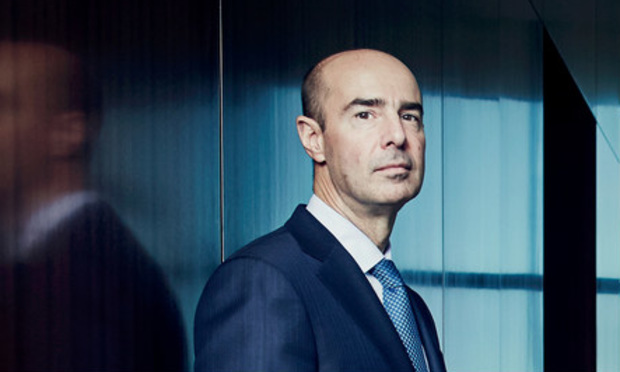Litigator of the Week: Eugene Scalia Scores Again
Gibson, Dunn & Crutcher partner Eugene Scalia took out a truly monster-sized regulation: the Department of Labor's fiduciary rule.
March 23, 2018 at 01:18 AM
6 minute read

When the Labor Department brought the fiduciary rule back from the dead in the final year of the Obama presidency, reviving a controversial proposal the agency had tabled in 2011, Gibson, Dunn & Crutcher partner Eugene Scalia considered it a privilege to challenge the retirement-savings regulation.
For the industry, the rule threatened to usher in some of the most sweeping regulatory changes in 50 years. For Scalia, co-chairman of Gibson Dunn's administrative law and regulatory practice group, it represented “one of the broadest, most aggressive regulatory maneuvers I've ever seen by an agency,” he said.
But before he could explain any of that to the U.S. Court of Appeals for the Fifth Circuit, Scalia had to explain to his family why he would be missing at least a portion of their planned vacation to the Mediterranean.
“We moved the Fifth Circuit to expedite the case, and the court promptly announced that argument would be the week I was scheduled to be on a cruise in the Mediterranean with my family. I had a difficult conversation with my wife, explaining that I couldn't go back and tell the court the case was important—but not that important,” Scalia recounted in an interview this week.
After a conversation with the clerk, the Fifth Circuit scheduled the argument for the beginning of that week, allowing Scalia to fly from New Orleans to catch up with the cruise in Nice, Italy. And so, within 24 hours of arguing about administrative law, the tax code and arcane regulations for private sector pension plans, Scalia was enjoying perhaps the perfect antidote to that tumbleweed of legal issues: a Mai Tai by the pool on the deck of a cruise ship.
Vacation aside, it turned out there was cause for celebration. On March 15, a divided three-judge panel of the Fifth Circuit sided with Scalia and struck down the regulation, ruling that the Labor Department overreached by requiring retirement investment advisers to work in their clients' best interests.
In her opinion for the panel, Judge Edith Jones wrote that the Labor Department, under former Secretary Thomas Perez, “made no secret of its intent to transform the trillion-dollar market for [Individual Retirement Account] investments, annuities and insurance products, and to regulate in a new way the thousands of people and organizations working in that market.”
Although the Labor Department has the option of appealing the panel ruling, either to an en banc Fifth Circuit or the Supreme Court, Jones' opinion last week likely marked the end of Scalia's nearly two-year challenge on behalf of nine trade groups, including the U.S. Chamber of Commerce and Financial Services Roundtable.
The rule had been championed by Perez and President Barack Obama's White House. Then the election happened. Under the Trump administration, the Labor Department continued defending the fiduciary rule—but held its nose while doing so. Trump ordered the agency last year to reconsider the fiduciary rule, a move expected to result in revisions or a repeal of the rule.
The 2016 election, and the ensuing regulatory whiplash, was hardly the first curveball thrown to Scalia. Within weeks of suing to undo the rule, in June 2016, Scalia effectively picked up more than a dozen additional clients when the case was combined with two separate challenges brought by Sidley Austin and Wilmer Cutler Pickering Hale and Dorr in the U.S. District Court for the Northern District of Texas.
Scalia, working closely with fellow Gibson Dunn partner Jason Mendro, entered the case with nine trade associations—groups with the, at times, unenviable task of moving in unison with competing member businesses that all want to be heard. With the consolidation of the three cases, the fiduciary rule challenge required coordination with 13 more trade groups, along with “a number of really fine lawyers” at Sidley Austin and Wilmer Hale, Scalia said.
“All of our clients — both the clients represented by Gibson Dunn and the other firms — had a shared goal of getting the court to see all the problems with this rule. We also saw, legally, many of the same problems. There were certain legal arguments that were given more emphasis by one firm, other arguments by another. But they formed a consistent whole and together gave the court a clear picture of an unprecedented rule that wasn't even in an area of the Labor Department's responsibility,” Scalia said.
The toughest challenge, Scalia said, was painting a clear picture of the fiduciary rule's flaws and the related regulatory landscape. The task involved taking a complicated area of the law and a rule that was “gargantuan in scope,” Scalia said, “and helping explain to the court in a simple, straightforward way how sweeping and problematic the implications were.”
As part of that strategy, the lawyers and their clients agreed they would be most effective with a single voice during the arguments before the Fifth Circuit panel. Scalia was chosen. The “overarching theme,” he said, was that the fiduciary rule represented a “serious overreach and abuse of authority by the Department of Labor.”
“Whenever you're going into oral argument, it's preferable to be able to weave the arguments together,” Scalia said. “That gets harder when you split the argument into pieces. I think we all came to recognize we could most effectively help the court see the missteps the department made if we could present them as a coherent narrative.”
The victory before the Fifth Circuit, which reversed a loss before Chief Judge Barbara M.G. Lynn in federal district court, leaves the fiduciary rule's future uncertain. Just days before the Fifth Circuit's ruling, the U.S. Court of Appeals for the 10th Circuit upheld a portion of the regulation, in an opinion so narrow that Scalia disputes the existence of a split among the federal appeals courts. A challenge in the U.S. Court of Appeals for the D.C. Circuit is pending.
Scalia said the Fifth Circuit's ruling makes it easy for the Labor Department to walk away from the fiduciary rule.
“I think the Fifth Circuit has thoroughly addressed the concerns presented by this rule. It's vacated the rule. It's provided the very relief the plaintiff in the D.C. Circuit has sought,” Scalia said. “From my perspective, there's no point of the D.C. Circuit case continuing.”
This content has been archived. It is available through our partners, LexisNexis® and Bloomberg Law.
To view this content, please continue to their sites.
Not a Lexis Subscriber?
Subscribe Now
Not a Bloomberg Law Subscriber?
Subscribe Now
NOT FOR REPRINT
© 2025 ALM Global, LLC, All Rights Reserved. Request academic re-use from www.copyright.com. All other uses, submit a request to [email protected]. For more information visit Asset & Logo Licensing.
You Might Like
View All
Trick or Treat? How an Office Halloween Party Convo Led to a Quinn Associate's Appellate Argument

Litigators of the Week: 5 Weeks Into Countrywide Trial, Quinn and Patterson Belknap Bring Home $1.84B Settlement for Ambac

Litigators of the Week: Hogan Lovells Flips Citi's Big Loss Over a Half a Billion Bucks in Mistakenly Wired Funds

Litigators of the Week: This Paul Hastings Duo Flipped the Conviction of a Trader Accused of Manipulating LIBOR
Trending Stories
- 1Lawyers' Reenactment Footage Leads to $1.5M Settlement
- 2People in the News—Feb. 4, 2025—McGuireWoods, Barley Snyder
- 3Eighth Circuit Determines No Standing for Website User Concerned With Privacy Who Challenged Session-Replay Technology
- 4Superior Court Re-examines Death of a Party Pending a Divorce Action
- 5Chicago Law Requiring Women, Minority Ownership Stake in Casinos Is Unconstitutional, New Suit Claims
Who Got The Work
J. Brugh Lower of Gibbons has entered an appearance for industrial equipment supplier Devco Corporation in a pending trademark infringement lawsuit. The suit, accusing the defendant of selling knock-off Graco products, was filed Dec. 18 in New Jersey District Court by Rivkin Radler on behalf of Graco Inc. and Graco Minnesota. The case, assigned to U.S. District Judge Zahid N. Quraishi, is 3:24-cv-11294, Graco Inc. et al v. Devco Corporation.
Who Got The Work
Rebecca Maller-Stein and Kent A. Yalowitz of Arnold & Porter Kaye Scholer have entered their appearances for Hanaco Venture Capital and its executives, Lior Prosor and David Frankel, in a pending securities lawsuit. The action, filed on Dec. 24 in New York Southern District Court by Zell, Aron & Co. on behalf of Goldeneye Advisors, accuses the defendants of negligently and fraudulently managing the plaintiff's $1 million investment. The case, assigned to U.S. District Judge Vernon S. Broderick, is 1:24-cv-09918, Goldeneye Advisors, LLC v. Hanaco Venture Capital, Ltd. et al.
Who Got The Work
Attorneys from A&O Shearman has stepped in as defense counsel for Toronto-Dominion Bank and other defendants in a pending securities class action. The suit, filed Dec. 11 in New York Southern District Court by Bleichmar Fonti & Auld, accuses the defendants of concealing the bank's 'pervasive' deficiencies in regards to its compliance with the Bank Secrecy Act and the quality of its anti-money laundering controls. The case, assigned to U.S. District Judge Arun Subramanian, is 1:24-cv-09445, Gonzalez v. The Toronto-Dominion Bank et al.
Who Got The Work
Crown Castle International, a Pennsylvania company providing shared communications infrastructure, has turned to Luke D. Wolf of Gordon Rees Scully Mansukhani to fend off a pending breach-of-contract lawsuit. The court action, filed Nov. 25 in Michigan Eastern District Court by Hooper Hathaway PC on behalf of The Town Residences LLC, accuses Crown Castle of failing to transfer approximately $30,000 in utility payments from T-Mobile in breach of a roof-top lease and assignment agreement. The case, assigned to U.S. District Judge Susan K. Declercq, is 2:24-cv-13131, The Town Residences LLC v. T-Mobile US, Inc. et al.
Who Got The Work
Wilfred P. Coronato and Daniel M. Schwartz of McCarter & English have stepped in as defense counsel to Electrolux Home Products Inc. in a pending product liability lawsuit. The court action, filed Nov. 26 in New York Eastern District Court by Poulos Lopiccolo PC and Nagel Rice LLP on behalf of David Stern, alleges that the defendant's refrigerators’ drawers and shelving repeatedly break and fall apart within months after purchase. The case, assigned to U.S. District Judge Joan M. Azrack, is 2:24-cv-08204, Stern v. Electrolux Home Products, Inc.
Featured Firms
Law Offices of Gary Martin Hays & Associates, P.C.
(470) 294-1674
Law Offices of Mark E. Salomone
(857) 444-6468
Smith & Hassler
(713) 739-1250






